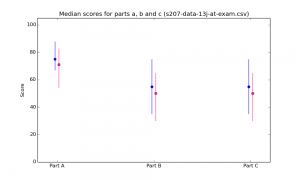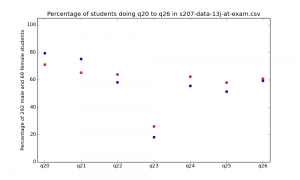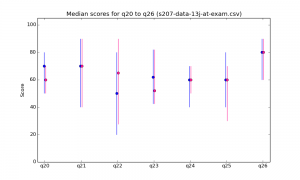I’m returning to the topic raised here. To summarise, significantly fewer women than men study our level 2 (FHEQ L5) physics module S207 and, more worryingly, those who do are significantly less likely to complete it, and those who complete it are less likely to pass…It’s a depressing situation and we have been trying to find out more about what is going on. We don’t have definite answers yet, but we do have some pointers – and we are hoping that if we can begin to address the issues we will be able to improve the outcomes for all students on S207 (both men and women).
In my previous post I explained that women do less well on almost all interactive computer-marked assessment (iCMA) questions, but the amount by which they do less well varies from question to question. This does not appear to depend on question type.
Next, let’s consider the S207 exam. The exam has three parts with (a) multiple-choice questions; (b) short-answer questions; (c) longer questions. Students are expected to attempt all questions in part (a) and part (b), whilst in part (c) they should attempt three questions from a choice of 7 (one on each of the main books in the module).
Let’s start by considering performance on each of the three parts of the exam (all the data are for the 2013-14 presentation). The average score for men and women for each of the three parts are shown in the figure below (blue = men; pink = women, with my apologies for any offence caused by my sexist stereotyping on colour, but I’m sticking with it because it is obvious).
So, women do less well on multiple-choice questions, as you would have been expecting if you’ve read the literature…but they also do less well on short-answer and long-answer questions (though do note the fact that the error bars overlap)…Hmmm.
Things get much more interesting if we consider how many men and women choose to answer each of the longer questions in part (c):
So relatively fewer women are choosing to answer the first two questions; relatively more are choosing the answer the others. And how well do they do on each question? See below:
So, all questions are not equal. Men and women appear to prefer different questions and to perform differently on different questions. And we have also seen that we are more likely to loose students when they are studying the materials that are assessed in the first two exam questions. So it looks as if women do even worse on some parts in the module than others. What we don’t know yet is whether this is as a result of the topic in question (in this case Newtonian mechanics) or that they are less good at problem solving, less familiar with the abstract types of questions that we are asking, or whether less structured long questions put them off (c.f. questions where they are given more tips). We also need to do more work to test some hypotheses that might explain some of these factors e.g. that whilst women are as likely as men to have A levels, they may be less likely to have A level physics or maths. Our investigation is far from over.



